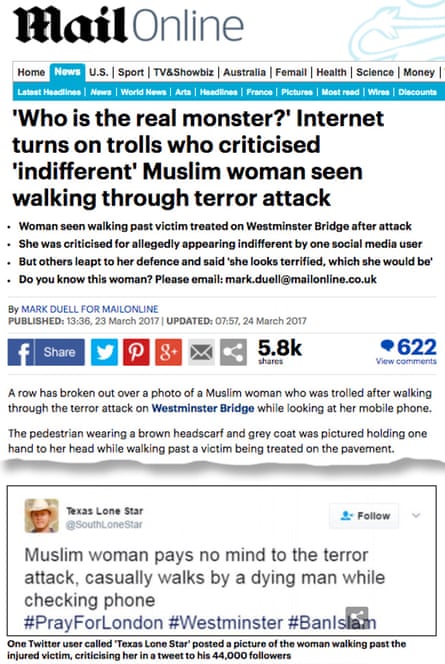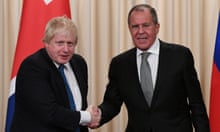A simple tweet, sent when a nation is in shock, is a quick and effective way of provoking outrage. That’s what @SouthLoneStar discovered after rebuking British Muslims in the wake of the Westminster terrorist attack in March. After the attack, the tweeter shared a photograph of a young Muslim woman walking along the bridge looking at her phone, and wrongly accused her of ignoring the injured. It was swiftly picked up in the media – and the depiction of the incident became a minor cause célèbre.
Q&AWhat is a Twitter bot?
Show
Strictly defined, a Twitter bot is any automated account on the social network. That can be something as simple as automatically tweeting links to news articles – most of the Guardian's social media accounts are technically Twitter bots, for instance – to complex interactions like automatically generating Emoji-based art or automatically replying to climate change deniers with scientific evidence.
But, as with "troll" and "fake news", the strict definition has been forgotten as the term has become one of political conflict. The core of the debate is the accusation that a number of political tweets were sent by "Russian bots", with the intention of subverting political debate, or simply creating chaos generally.
Based on what we know about Russian information warfare, the Twitter accounts run by the country's "troll army", based in a nondescript office building in St Petersburg, are unlikely to be automated at all. Instead, accounts like @SouthLoneStar, which pretended to be a Texan right-winger, were probably run by individuals paid 45-65,000 rubles a month to sow discord in Western politics.
In other ways, they resembled bots – hence the confusion. They rarely tweeted about themselves, sent far more posts than a typical user, and were single-minded in what they shared. People behaving like bots pretending to be people: this is the nature of modern propaganda.
SouthLoneStar appeared to be a fairly conventional member of the American “alt-right” taking a sudden interest in London. And he – or perhaps she – was pleased with the result. For days after, the tweeter was gleefully sharing press clippings. “Wow … I’m on the Daily Mail front page! Thank you British libs! You’re making me famous,” he said, referring to an article that appeared on Mail Online and which still bore the tweet at the time of writing. A day later: “I’m on The Sun! Thank you again, British libs! Now I’m even more famous!”

But there was a hidden – and disturbing – dimension to the incident, because this tweeter was part of a Russian disinformation campaign.
Until the Twitter account was suspended in summer 2017 for its Russian links, @SouthLoneStar sought quite a different identity. With a bio that proclaimed him a “proud TEXAN and AMERICAN patriot”, hashtags showing his support for the second amendment and opposition to abortion, and an avatar of a fuzzy-faced young man in a cowboy hat, he might have been any one of millions of Donald Trump-supporting Americans.
He was, naturally, a vociferous opponent of Hillary Clinton and Barack Obama, attacking them for “creating Isis under Obama’s rule”. “I don’t think it is possible to beat Isis while its co-founder Hussein Obama is living in the White House,” he tweeted on Boxing Day 2016, before celebrating on New Year’s Day that the “traitor-in-chief leaves the White House in 18 days”.
LoneStar’s partisan support for Trump did not extend to the rest of his team, however. By April 2017, he was joining in with a campaign to “#KeepBannon & #FireKushner” that had been started by a former rapper turned alt-right star. Trump’s son-in-law, Jared Kushner, was a “liberal snake pushing his agenda in [the] White House”, LoneStar tweeted. “With all respects to @IvankaTrump but we didn’t vote for Kushner’s policies, especially if these policies influenced by Soros!”
Eclipsing his interest in domestic American politics, however, was LoneStar’s obsession with Islam. World news was filtered through that lens: terrorist attacks in Europe were a regular focus on his timeline, as were links to stories on far-right news websites about “jihadi training camps” in UK prisons, images of Muslims burning American flags outside the US embassy, or a picture of men chanting “Allahu Akbar” while receiving sentences for child abuse.
Despite the antisemitic subtext of his attacks on Kushner as a “globalist liberal” backed by George Soros, he would regularly announce his support for Israel. He called on French people to elect Marine Le Pen and “take your nation back”.
There were other UK-focused tweets too: another tweet was edited to contrast the Muslim woman in Westminster with Tobias Ellwood, the MP who tried to save shot police officer Keith Palmer. The images were captioned “them” and “us”.

Yet, spread throughout his 4,000-odd tweets, delivered by the end of his two years on the site to 50,000 followers, was little personal detail. SouthLoneStar did not tweet about his home life, or spend much time discussing Texan politics in particular.
That is not surprising now. Twitter has concluded he did not exist.
The site suspended the account and decided that SouthLoneStar was the creation of the Internet Research Agency, a Russian “troll army” based in St Petersburg. This is where, in rooms of about 20 people working 12-hour shifts for pay of between 45,000 and 65,000 rubles a month (£575-£830), a modern disinformation campaign is crafted.
Initially, the agency was focused on the information war between Russia and Ukraine. “We had to write ‘ordinary posts’, about making cakes or music tracks we liked, but then every now and then throw in a political post about how the Kiev government is fascist,” one former worker told the Guardian in 2015.
But eventually, the focus turned from justifying Russia’s occupation of Crimea to more actively interfering in the politics of other nations. SouthLoneStar’s account was created in 2015, comparatively late for the agency, which tends to activate accounts early and leave them dormant until they are needed.
Although Twitter discovered and closed @SouthLoneStar in the summer of 2017, its Russian affiliation was only made public this month, when the company handed Congress a list of 2,700 accounts that had been involved in US political discussion and were suspected to be run by the Internet Research Agency.










